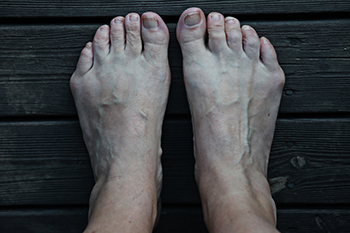 A tailor’s bunion, also known as a bunionette, occurs when the 5th metatarsal bone (the bottom bone on the little toe) begins to shift outwards. Tailor’s bunions are very similar to a normal bunion which occurs on the big toe, but instead, they occur on the pinky toe. A tailor’s bunion will present itself as a swollen bump on the outside of the pinky toe, and it may get larger over time. They can be red and painful, and they tend to get worse as they rub against the shoe. Some of the reasons Tailor’s bunions may form include shoes that don’t fit correctly, an inherited structural foot problem, loose ligaments in the foot, or an inverted foot that leans outwards. Patients who are struggling with a painful Tailor’s bunion should consult with a podiatrist for suggestions on both relieving the pain and treating the bunion.
A tailor’s bunion, also known as a bunionette, occurs when the 5th metatarsal bone (the bottom bone on the little toe) begins to shift outwards. Tailor’s bunions are very similar to a normal bunion which occurs on the big toe, but instead, they occur on the pinky toe. A tailor’s bunion will present itself as a swollen bump on the outside of the pinky toe, and it may get larger over time. They can be red and painful, and they tend to get worse as they rub against the shoe. Some of the reasons Tailor’s bunions may form include shoes that don’t fit correctly, an inherited structural foot problem, loose ligaments in the foot, or an inverted foot that leans outwards. Patients who are struggling with a painful Tailor’s bunion should consult with a podiatrist for suggestions on both relieving the pain and treating the bunion.
If you are suffering from bunion pain, contact one of our podiatrists of Sayville Foot Care. Our doctors can provide the care you need to keep you pain-free and on your feet.
What Is a Bunion?
Bunions are painful bony bumps that usually develop on the inside of the foot at the joint of the big toe. As the deformity increases over time, it may become painful to walk and wear shoes. Women are more likely to exacerbate existing bunions since they often wear tight, narrow shoes that shift their toes together. Bunion pain can be relieved by wearing wider shoes with enough room for the toes.
Causes
- Genetics – some people inherit feet that are more prone to bunion development
- Inflammatory Conditions - rheumatoid arthritis and polio may cause bunion development
Symptoms
- Redness and inflammation
- Pain and tenderness
- Callus or corns on the bump
- Restricted motion in the big toe
In order to diagnose your bunion, your podiatrist may ask about your medical history, symptoms, and general health. Your doctor might also order an x-ray to take a closer look at your feet. Nonsurgical treatment options include orthotics, padding, icing, changes in footwear, and medication. If nonsurgical treatments don’t alleviate your bunion pain, surgery may be necessary.
If you have any questions, please feel free to contact our office located in Sayville, NY . We offer the newest diagnostic and treatment technologies for all your foot care needs.
